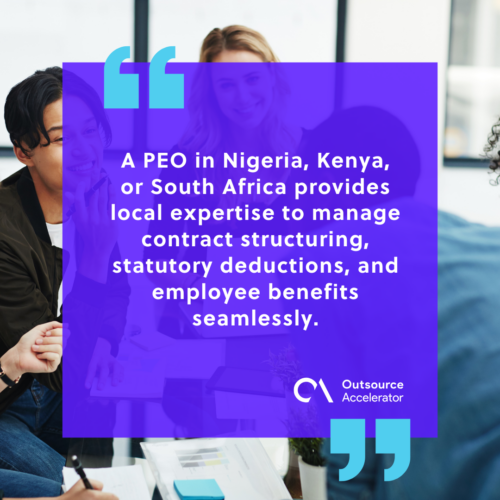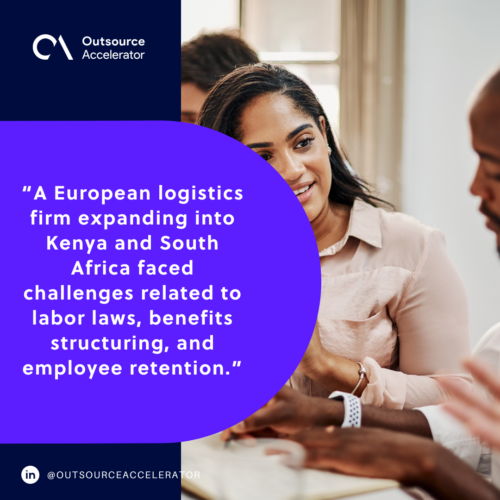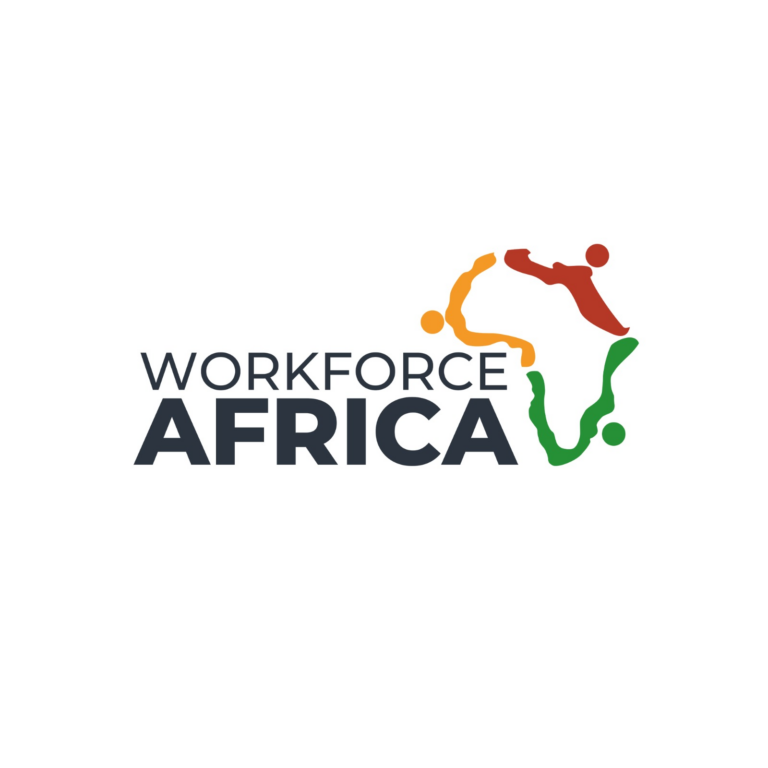5 ways PEOs can share global employers’ responsibilities

This article is a submission by Workforce Africa. Workforce Africa specializes in managed teams, offering professional, innovative, and comprehensive solutions for African expansion and talent needs.
“As businesses expand across international markets, managing employees, ensuring compliance with labour laws, and providing attractive benefits packages become increasingly complex. Many companies; especially those expanding into Africa turn to Professional Employer Organisations (PEOs) to navigate these challenges efficiently.”
A PEO is a company that provides outsourced human resources (HR), payroll, benefits, and compliance services, acting as a co-employer to take on responsibilities related to workforce management.
By partnering with a PEO, businesses can offload essential employer functions while focusing on strategic growth and operational efficiency.
A Gartner report states that by 2025, 70% of businesses will adopt hybrid work models, making PEO services more crucial than ever in ensuring businesses remain compliant, efficient, and competitive.
For organisations seeking to expand into Africa’s emerging markets, leveraging a PEO in Africa offers a competitive advantage. Providers help global employers simplify employment processes, manage risks, and build sustainable workforces across multiple African markets.
Employer responsibilities PEOs can take on
Here are several of the responsibilities that a Professional Employer Organization can handle
1. Human Resources management
HR management is one of the most resource-intensive functions for businesses, particularly in global expansion.
PEOs streamline HR processes by offering services such as:
- Talent acquisition & recruitment – Finding the right talent, conducting background checks, and onboarding employees.
- Training & development – Ensuring employees have the necessary skills to contribute effectively.
- Performance management – Implementing performance reviews and feedback systems to foster employee growth.
- Compliance with labor laws – Adhering to country-specific employment regulations to mitigate risks.
In Africa, where labor laws vary significantly across countries, ensuring compliance is a major challenge. A PEO in Nigeria, Kenya, or South Africa provides local expertise to manage contract structuring, statutory deductions, and employee benefits seamlessly.

2. Employee benefits & compensation
Providing competitive employee benefits is crucial for attracting and retaining top talent. PEOs help businesses design cost-effective benefits packages while ensuring compliance with local compensation laws.
How PEOs support employee benefits:
- Health insurance – Access to collective group health plans at lower costs.
- Retirement plans & pension schemes – Structuring employee savings for long-term financial security.
- Paid leave & statutory benefits – Ensuring compliance with national labor laws regarding annual leave, sick leave, and maternity/paternity benefits.
For instance, in Nigeria, the Pension Reform Act mandates that employers contribute 10% of an employee’s salary to a pension fund, with employees contributing 8%. A PEO in Nigeria ensures seamless pension administration, preventing compliance issues.
3. Strategic workforce planning
Workforce planning involves aligning HR strategies with business objectives to ensure long-term growth and stability.
A PEO’s workforce planning expertise allows businesses to:
- Project workforce needs – Anticipating hiring needs based on company expansion goals.
- Identify skill gaps – Ensuring organizations hire employees with the right skill sets.
- Optimize workforce costs – Reducing hiring expenses through efficient recruitment processes.
PEOs integrate workforce analytics and industry insights to help businesses build a sustainable talent pipeline.
For instance, as Africa’s tech ecosystem continues to grow, companies looking to outsource IT or software development roles can use PEOs to source top talent across Africa’s thriving digital markets.
4. Employee surveys & workplace insights
Employee engagement is a key factor in business success. Conducting employee surveys provides insights into workplace culture, job satisfaction, and organizational development.
Key benefits of employee surveys:
- Measure employee engagement & productivity.
- Identify workplace concerns before they escalate.
- Assess employee satisfaction with company policies and management.
How PEOs support employee surveys:
- Survey design & distribution – Structuring surveys that collect meaningful insights.
- Data analysis & reporting – Identifying trends and areas for improvement.
- Actionable recommendations – Helping businesses implement workplace enhancements based on survey feedback.
For businesses operating across multiple African regions, PEOs help customize employee engagement strategies that align with diverse workforce expectations.
5. Transition & succession management
Managing workforce transitions; whether due to leadership changes, restructuring, or expansion can be challenging for businesses.
PEOs offer expertise in transition management to ensure seamless leadership succession and organisational stability.
How PEOs Assist with Transition Management:
- Leadership succession planning – Ensuring businesses have the right talent to fill leadership roles.
- Employee exit management – Handling layoffs, severance, and legal compliance.
- Workforce restructuring support – Helping companies navigate workforce changes smoothly.
In Africa, where businesses often expand across multiple countries, transition management ensures continuity and compliance with regional employment laws.
A case study of multinational firms expanding into Ghana and Rwanda showed that effective transition planning reduced business downtime by 30%.
Why businesses choose PEOs for global expansion
The competitive advantage of using PEOs in Africa
- Compliance assurance – Expert handling of local labor laws, tax regulations, and payroll administration.
- Faster market entry – Businesses can establish operations in new countries without setting up legal entities.
- Risk mitigation – Reducing HR-related legal and compliance risks.
- Cost savings – Lower recruitment costs compared to in-house HR management.
- Case Study: Expanding into Africa with a PEO
A European logistics firm expanding into Kenya and South Africa faced challenges related to labor laws, benefits structuring, and employee retention. By partnering with a PEO provider, the company:
- Reduced hiring costs by 50%.
- Achieved full compliance with local employment laws.
- Enhanced workforce productivity through employee engagement initiatives.

PEOs as a game-changer for global employers
PEOs offer a transformative solution for businesses expanding into global markets. By handling HR functions, compliance, benefits administration, and workforce planning, PEOs help companies focus on core business operations while minimizing risks.
For global employers looking to expand into Africa’s high-growth markets, partnering with an experienced PEO ensures seamless operations, legal compliance, and strategic workforce management.







 Independent
Independent




